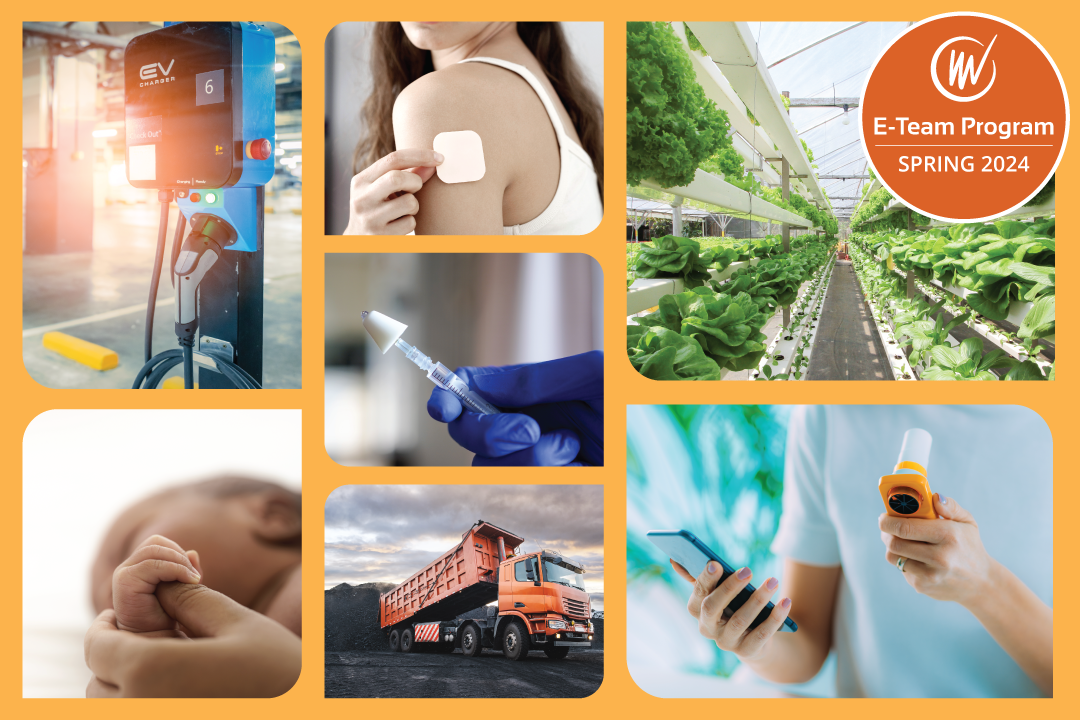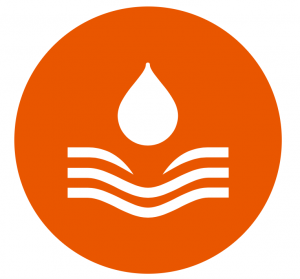
After a rigorous selection process, twenty-five teams have been chosen for the Spring 2024 cohort of the E-Team Program! These entrepreneurs are tackling pressing global challenges facing society, healthcare, and the environment through novel science- and technology-based innovations. Among them, 18 teams will begin their entrepreneurship journey by participating in Pioneer, the first stage of the E-Team Program, which includes $5,000 in grant funding and dedicated training to help uncover the ideal market for their inventions. Seven teams will advance to Propel, the second stage, where they will receive a $20,000 grant and further training in building their business model canvas and testing their business hypotheses.
“Our E-Team Program is tailor-made for innovators looking to take that next step toward commercialization,” said VentureWell Program Officer Sarah Wharmby. “Teams will not only receive grant funding, intensive entrepreneurship training, and dedicated mentorship, but they will also get national recognition. These are ‘final four’ caliber teams—and we couldn’t be more excited to pave the way for their innovations to make an impact.”
We are thrilled to support the debut of promising teams like NeoNest Global, which is developing a low-cost neonatal incubator with a collapsible design, allowing for easy assembly and transport to healthcare facilities in remote locations; and teams like the Streamline Charging, returning for Propel, which is developing customizable technology for electric vehicle (EV) charging that can reduce installation costs and make EVs more accessible to existing gas stations.
Learn more about the auspicious inventions being developed by our newest Pioneer and Propel teams:
Pioneer
 Agriculture
Agriculture
AgriBloom | The Ohio State University
Principal Investigator: Adithya Jayakumar
Team Members: Roan Kovach, Kalib Riddle
AgriBloom is developing real-time sensor technology that provides detailed assessments of soil parameters including moisture, pH levels, macro- and micronutrients, and the detection of heavy metals and pesticides, eliminating the need for a lab analysis, and optimizing sustainable farming methods.
Prospect Growth | Yale University
Principal Investigator: Clare Leinweber
Team Members: Andreas Backhaus, Wyatt Arnold
Prospect Growth is developing a nanoparticle-based fertilizer that acts as a sustainable and cost-effective alternative to chemical fertilizers, increasing crop yields and reducing nutrient waste.
Solar Sprout | Case Western Reserve University
Principal Investigator: Jonathan Steirer
Team Members: Lexi Knight, Ryan Seymour
Solar Sprout is developing semi-transparent organic solar cells that cover crops, boosting growth and enabling farms to improve agricultural productivity while leveraging renewable energy sources.
 Environment
Environment
Smartective | Louisiana State University
Principal Investigator: Nicholas Totaro
Team Members: Nicholas Demas, Paul Menasco, Raedan Stephens
Smartective is developing a wearable device that gathers real-time environmental and biometric data, conducting cognitive assessments and alerting workers in environmental, chemical, oil, and energy companies of potential safety risks in order to minimize workplace hazards.
ThreadMap | Yale University
Principal Investigator: Clare Leinweber
Team Members: Maggie Boreham, Eunjee Koh
ThreadMap is developing a one-stop SaaS platform that tracks a garment from production to end-of-life, enabling a transparent and circular future for fashion and apparel.
Healthcare/Medical
ArcticFlow Cooler | Houston Community College
Principal Investigator: Sujit Mondal
Team Members: Sara Blaghi, Hassan Khan, Dylan Thach
ArcticFlow Cooler is developing an advanced circulation cooling system that controls temperature without the use of ice, ensuring a more effective way of preserving and transporting medicine.
Ekyaalo Diagnostics | Johns Hopkins University
Principal Investigator: Soumyadipta Acharya
Team Members: Teja Sathi, Kim Hwang Yeo
Ekyaalo Diagnostics is developing a low-cost system for interpreting cytology samples using smartphones, enabling rapid diagnosis for healthcare workers and improving treatment for breast cancer for patients in underserved communities.
EndoSurgical Innovations, Inc. | Northwestern University
Principal Investigator: Jeff La Belle
Team Members: Talia Krainc, Collin Larkin, Mahly Lewis
EndoSurgical Innovations is developing VariGuide, low-cost novel guidewire technology with 360-degree steerability and variable stiffness, which will increase safety and efficiency for stroke treatment during endovascular thrombectomy procedures.
ERBD | Xavier University of Louisiana
Principal Investigator: Shearon Roberts
Team Member: Ebenezer Nyenwe
ERBD is developing software that provides real-time analysis for hospital systems that highlight areas of bias involving patients from underserved communities, improving healthcare experiences for both the patient and provider.
inSTENT Connection | University of Washington
Principal Investigator: Eric Seibel
Team Members: Brandon Lou, Gillian Pereira
inSTENT Connection is developing 3D-printable stents and sutures with an expandable design that can be implanted and absorbed into the body, eliminating the need for staples and sutures used in gastrointestinal surgery.
NeoNest Global | University of Michigan
Principal Investigator: Mariah Fiumara
Team Members: Erin Donnelly, Dhiya Krupashankar
NeoNest Global is developing a portable, low-cost, non-electronic neonatal incubator with a fully transparent and collapsible design, allowing for easy assembly and transport to healthcare facilities in remote locations.
QuikReversal | Johns Hopkins University
Principal Investigator: Josh Ambrose
Team Members: Yitzhak Goldstein, Asher Varon
QuikReversal is developing Vive, a disposable, non-electronic, wearable device that automatically detects a lethal opioid overdose, delivering an immediate antidote of naloxone without the need for bystander intervention.
SinuStim | Johns Hopkins University
Principal Investigator: Youseph Yazdi
Team Members: Oriol Cuxart, Sandhya Tiku
SinuStim is developing a non-invasive device that, when placed in the mouth, delivers an electrical stimulation to a key nerve located at the front of the hard palate, reducing mucous and increasing air space for patients with chronic rhinosinusitis.
Trinity Tube | The University of Texas at Austin
Principal Investigator: Chris Rylander
Team Members: Thomas Hristov, Iman Salafian
Trinity Tube is developing a comfortable, multifunctional neonatal feeding tube capable of continuous vital sign monitoring, reducing the need for skin-mounted sensors that can irritate the skin of infants who are born premature.
 Information Technology & Communication
Information Technology & Communication
Dashboard Eatz | North Carolina A&T State University
Principal Investigator: Steven Jiang
Team Members: Mikaya Hamilton, Victoria Lanier
Dashboard Eatz is developing a cloud-based dashboard tool for food banks that analyzes and tracks U.S. demographic data, providing information regarding potential cultural food preferences for specific service areas.
 Infrastructure/Building
Infrastructure/Building
Net-Zeros Infra-Materials | University of Louisville
Principal Investigator: Young Hoon Kim
Team Members: Janell Prater, Samuel Wright
Net-Zeros Infra-Materials is developing a microwave-based system that can create sustainable building materials using industrial byproducts, reducing water consumption and carbon dioxide emissions in the construction industry in regions with limited water resources.
 Sanitation/Water
Sanitation/Water
AquaMesh | University of California-San Diego
Principal Investigator: Jacques Chirazi
Team Members: Alex Towfigh, David Truong
AquaMesh is developing a comprehensive water monitoring system using machine learning software and modular sensor technology, delivering precise real-time analysis to efficiently streamline water quality monitoring and replace the need for lab testing.
The Better Kitchen Sink | Pennsylvania State University
Principal Investigator: Marcy Milhomme
Team Members: Max Gibbard, Liam Goldstein
The Better Kitchen Sink is developing a low-cost, at-home filtration system that leverages gravity in order to clean greywater, enabling reuse and preserving drinking water supply for underserved communities experiencing water scarcity.
Propel
 Agriculture
Agriculture
Acreage Farms LLC | Embry-Riddle Aeronautical University
Principal Investigator: Ramy Rahimi
Team Members: Meagan Shivers, Collin Topolski, Marcos Zamora
Food scarcity is a growing concern. Vertical farming offers a sustainable solution that uses 98 percent less water than traditional agriculture; however, it requires the expensive installation of multiple high-quality sensors. Acreage Farms is developing a mobile monitoring system for vertical farms that records and collects 3D environmental data to improve plant growth, reducing costs and increasing accessibility.
 Environment
Environment
Gremix | Stanford University
Principal Investigator: Stefan Reichelstein
Team Member: Manju Pharkavi Murugesu
Fly ash, a waste product of coal, is used industry-wide as a replacement for cement in concrete. But with coal plants shutting down, fly ash is in short supply. Gremix is developing a cement replacement for concrete by recycling coal ash from landfills, which reduces carbon dioxide emissions.
 Healthcare/Medical
Healthcare/Medical
Airalux Medical | University of Pennsylvania
Principal Investigator: Andrew Tsourkas
Team Member: Yi-An Hsieh
Incentive spirometers are used to prevent lung complications after surgeries by encouraging deep breathing through exercises; however, patients struggle to use them and forget to record logs. Airalux Medical is developing an easy-to-use smart incentive spirometer that offers verbal and visual feedback during breathing exercises, tracking and sending that data to a smartphone app that allows providers to access recovery information in real time.
comPLEX Dx | Johns Hopkins University
Principal Investigator: Constanza Miranda
Team Members: Allyson Chiu, Joshua Devier, Abigail Yoo
In 2020, nearly 20,000 infants died in the U.S.; every year, the inability to diagnose respiratory pathogens quickly and effectively threatens to increase the annual number. comPLEX Dx is developing a rapid blood test to detect 12+ different pathogens in pediatric patients for rapid diagnosis of respiratory diseases, minimizing delays in treatment to address infant mortality rates.
DOVE Labs | Drexel University
Principal Investigator: Nagarajan Kandasamy
Team Members: David Gordon, Mohammad Ishmam, Anush Lingamoorthy
In 2021, over 80,000 people died from an opioid-related overdose, but only 46 percent of those had the potential for a bystander to be present when they died. DOVE Labs is developing a wearable shoulder band device that can sense an opioid overdose and automatically inject the antidote naloxone to reverse it, increasing the chances to save a life without the need for intervention.
Horizen Biotech | California Polytechnic State University
Principal Investigator: Thomas Katona
Team Members: Camden Ford, Owen Works
Up to 30 percent of U.S. college students report driving under the influence (DUI) of alcohol. Horizen Biotech is developing a non-invasive, wearable skin patch that tracks blood alcohol content (BAC) levels through chemical sensing, allowing for discreet personal monitoring and clear color-coded visual markers to determine whether the user is at risk of a DUI (0.08 or greater BAC).
 Infrastructure/Building
Infrastructure/Building
Streamline Charging | Pennsylvania State University
Principal Investigator: Kathleen Hauser
Team Members: Shayaan Gandhi, Jonathan Smith
Installing multiple charging stations for EVs can be expensive for gas stations, requiring investment costs of up to $1 million. Streamline Charging is developing customizable, cost-efficient technology for EV charging that can service up to 10 parking spaces per station, reducing installation costs and making EV charging more accessible to existing gas stations.
Meet the Spring 2024 E-Team Partners and Sponsors
We are thankful for our partners that work with us to support these startups, including Qualcomm Incorporated, a leading wireless tech innovator; the Keenan Center for Entrepreneurship at The Ohio State University, our host for the in-person Pioneer and Propel workshops; and The Lemelson Foundation, a nonprofit dedicated to supporting the power of invention to improve lives.
The E-Team Entrepreneurial Journey
In our Spring 2024 cohort, all teams will undergo rigorous entrepreneurship training to enhance their innovations. During Pioneer, teams will identify the ideal market for their invention, understand potential venture pathways, and define their unique value in the context of the industry landscape. During Propel, teams will form and test their business model hypotheses. They’ll flesh out their business model canvas, verify it through customer interviews, and work on building their intellectual property portfolio. Participants in our spring workshops will convene in person at the Keenan Center for Entrepreneurship in Columbus, Ohio, April 18-19 (Pioneer) and May 2-3 (Propel).
About the E-Team Program
Through the E-Team Program, we have trained over 560+ student teams and 1,400 student innovators. The teams have raised over $480 million in follow-on funding and have launched 240+ ventures since taking part in our program.
Learn more about VentureWell’s E-Team Program, which supports student-led science- and engineering-based teams from across the nation in bringing their high-impact innovations out of the lab and into the market.